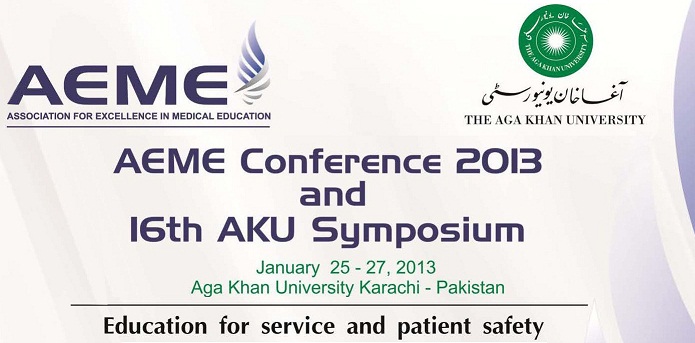Day 2 : Oral Presentations (Theme: Evaluation & Quality Assurance)
Perceptions of undergraduate medical students with regard to case based learning in Pathology (a non-traditional learning approach)
Location
Lecture Hall 1
Start Date
27-1-2013 9:00 AM
Abstract
Purpose: Medical education can flourish to its optimal potential only if it has strong roots in learning. Un-clarified concepts during learning silently make their way and act as de-motivating factors. Understanding and skillful implementation of modern methods of instructions can go a long way to resolve the difficulties in concept building, alleviating learners’ apprehensions and removing misconceptions. In public sector medical colleges the traditional teaching methods are being still practiced predominantly. These methods are teacher centered and usually support superficial and surface learning. These traditional teaching practices could hamper the development of clear concepts of pathology in undergraduates. This study presents a real time experience regarding the perceptions, feedback responses of undergraduate medical college students with regards to case based learning in pathology (a non-traditional method of learning).
Method: One hundred and forty, 4th year students of a public sector medical college participated in the study. In the last term the case based learning was adopted as a teaching method for various topics of pathology. At the end of last term, the written consent from the participants was taken. The participants were given a structured questionnaire to document their responses. The data was collected and processed by SPSS version 17 to calculate the frequency of responses to various questions.
Results: One hundred and forty 4th year medical students participated in the study. This study documented that 6% never, 10% rarely, 18% occasionally and 66% frequently preferred case based learning method , this learning method promoted deep learning and understanding among the students. Moreover, 5% never, 16%, 25% occasionally and 54% frequently documented that case based learning also enhanced their skills required for a better group interaction.
Conclusion: This study documents the students’ perceptions regarding case based learning. Such modern methods of teaching and learning at an undergraduate level can be helpful to students for a better understanding of the subject with an ever expanding knowledge in the field of health sciences.
Perceptions of undergraduate medical students with regard to case based learning in Pathology (a non-traditional learning approach)
Lecture Hall 1
Purpose: Medical education can flourish to its optimal potential only if it has strong roots in learning. Un-clarified concepts during learning silently make their way and act as de-motivating factors. Understanding and skillful implementation of modern methods of instructions can go a long way to resolve the difficulties in concept building, alleviating learners’ apprehensions and removing misconceptions. In public sector medical colleges the traditional teaching methods are being still practiced predominantly. These methods are teacher centered and usually support superficial and surface learning. These traditional teaching practices could hamper the development of clear concepts of pathology in undergraduates. This study presents a real time experience regarding the perceptions, feedback responses of undergraduate medical college students with regards to case based learning in pathology (a non-traditional method of learning).
Method: One hundred and forty, 4th year students of a public sector medical college participated in the study. In the last term the case based learning was adopted as a teaching method for various topics of pathology. At the end of last term, the written consent from the participants was taken. The participants were given a structured questionnaire to document their responses. The data was collected and processed by SPSS version 17 to calculate the frequency of responses to various questions.
Results: One hundred and forty 4th year medical students participated in the study. This study documented that 6% never, 10% rarely, 18% occasionally and 66% frequently preferred case based learning method , this learning method promoted deep learning and understanding among the students. Moreover, 5% never, 16%, 25% occasionally and 54% frequently documented that case based learning also enhanced their skills required for a better group interaction.
Conclusion: This study documents the students’ perceptions regarding case based learning. Such modern methods of teaching and learning at an undergraduate level can be helpful to students for a better understanding of the subject with an ever expanding knowledge in the field of health sciences.

